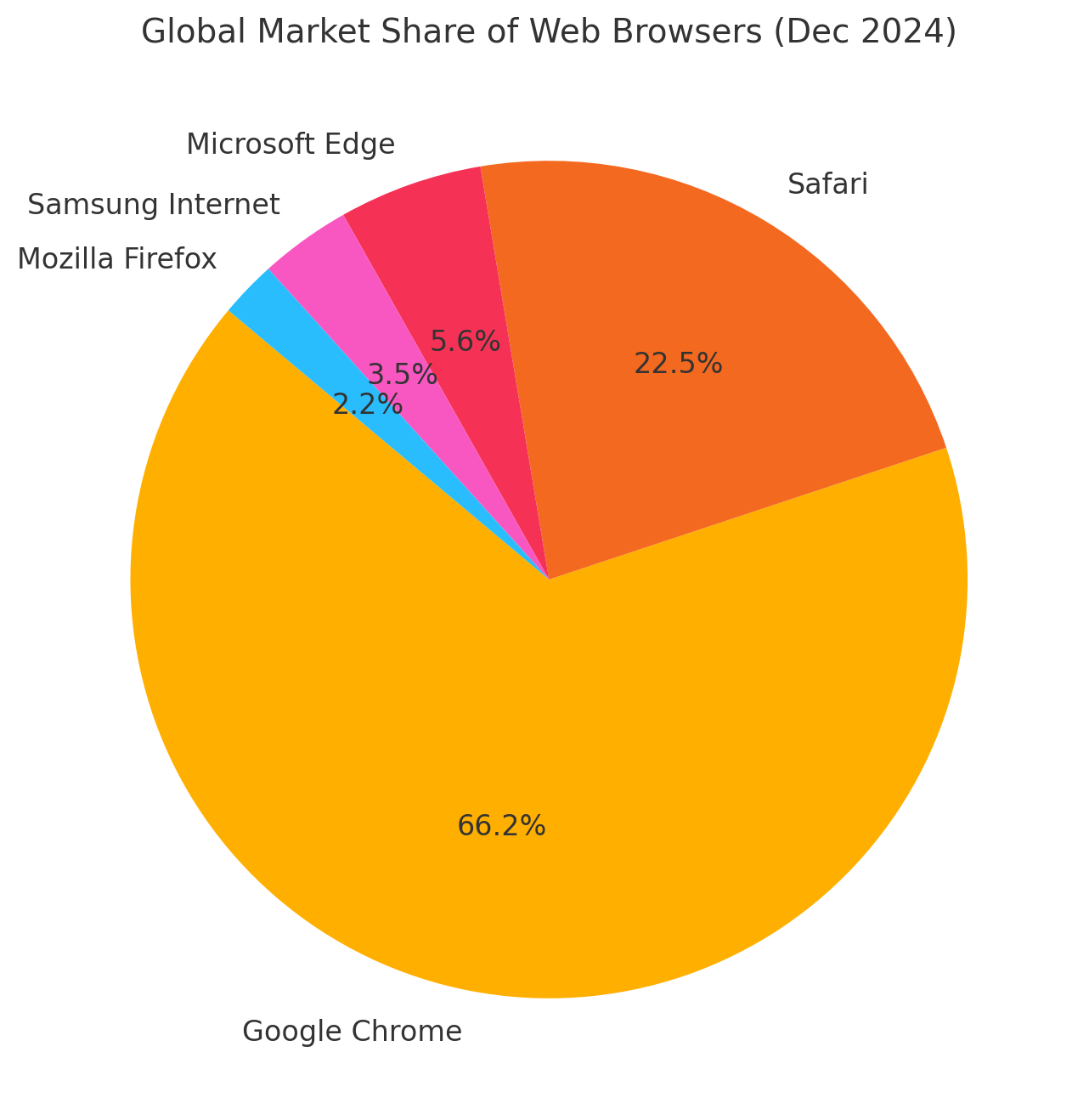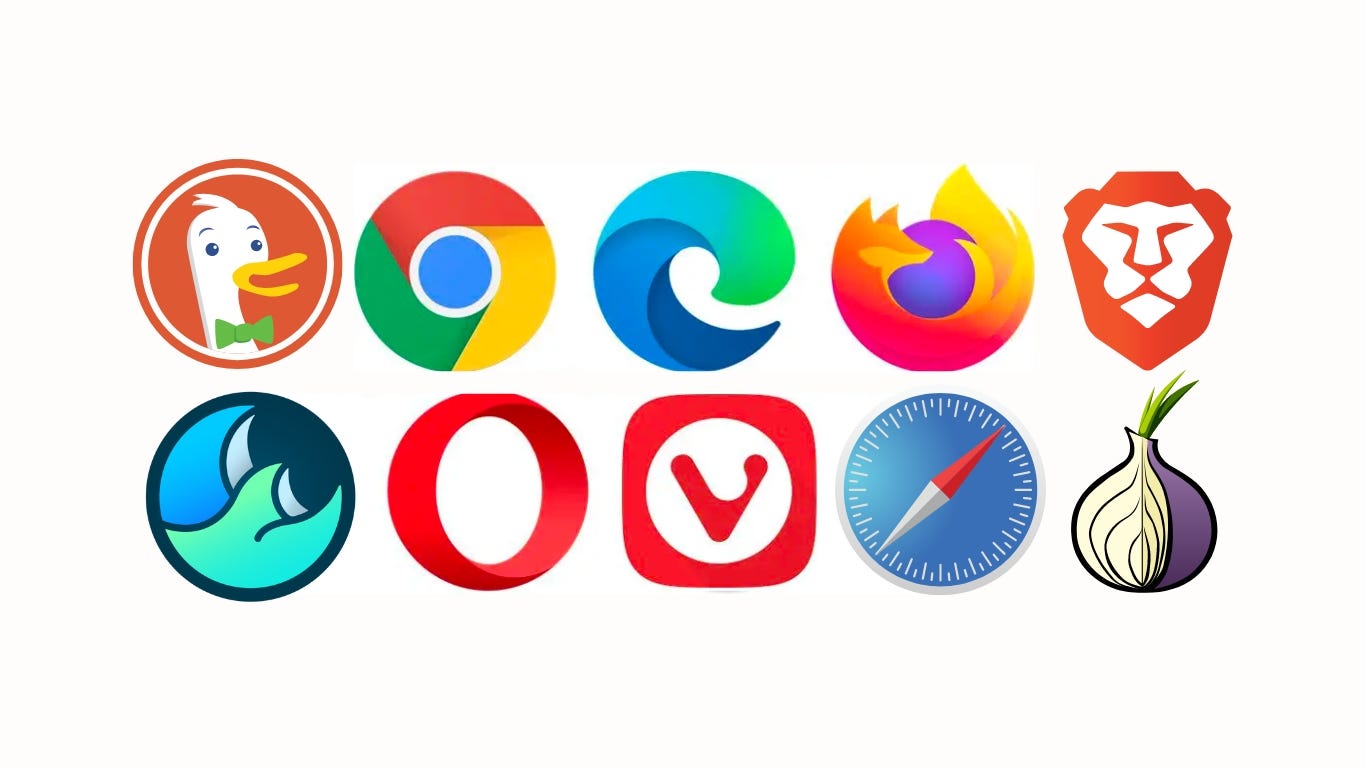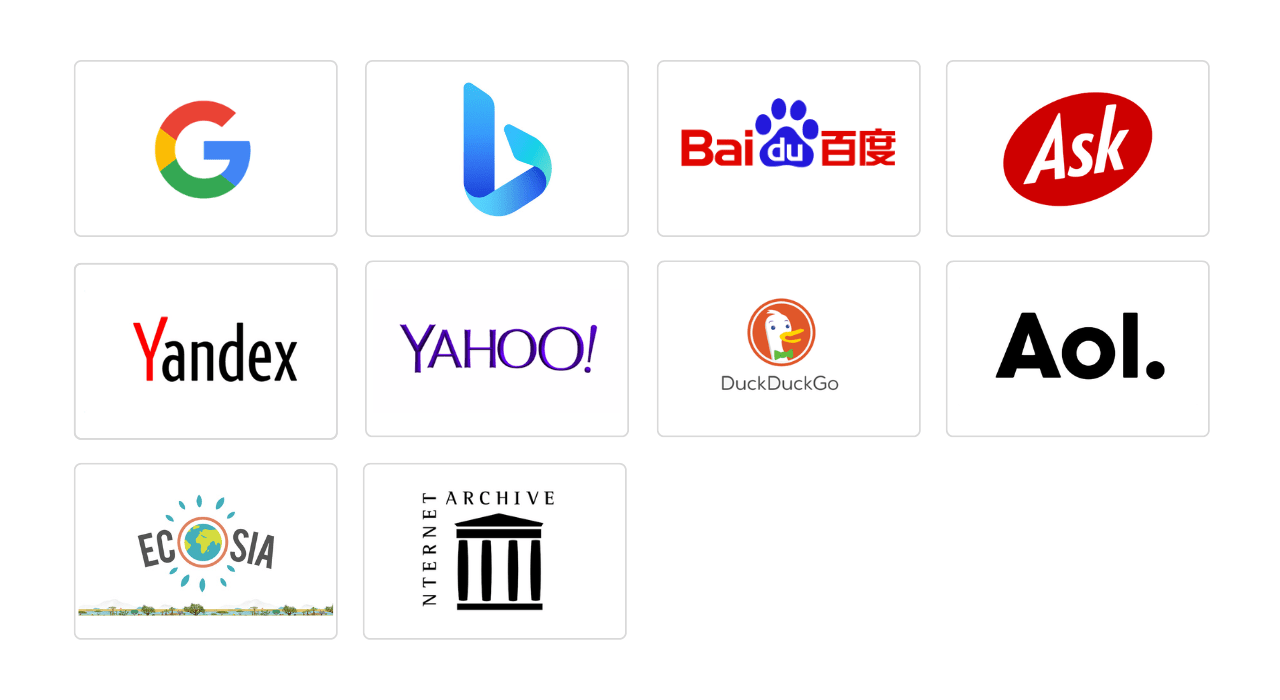Alternative Browsers, Search Engines & How AI is Changing Search
Gone are the day of browser wars, mainly between Navigator vs Internet Explorer. These days, Google Chrome is the dominant browser based on December 2024 data (see below for more). But for those who loves to tinker and would prefer alternatives, we present each alternative browsers and search engines, their strengths and why you should consider them. Plus, we ask the question that is in everyones mind, will generative AI will replace traditional search engines.
Current State of Play
According to SimilarWeb, as of December 2024, the most popular web browsers worldwide are as follows:
- Google Chrome: Dominates the market with a 63.99% share.
- Safari: Holds the second position with 21.77%.
- Microsoft Edge: Accounts for 5.37% of the market.
- Samsung Internet: Has a 3.4% share.
- Mozilla Firefox: Rounds out the top five with 2.12%.
As you can see, Google Chrome is the clear winner here with two thirds of the pie. This is followed by Safari, which are mainly on MacOS systems with over one fifth of the total browsers in use. The rest are pretty insignificant if you ask me. Microsoft Edge while based on Chromium only gets 5.37% of the share while Samsung Internet, a web browser developed by the company for their Android smartphones and tablets takes 3.4% share. This is followed closely by Firefox with 2.12%.

Now I would have thought that Microsoft Edge and Firefox have a bigger share of the pie seeing that one is preloaded on every Windows PC and the other has been around for a while and is pretty popular as most people would have heard the name. Alas, this is not the case.
Why Choose a Different Browser
Choosing a different browser from the default or most popular option can greatly enhance your online experience depending on your specific needs and priorities. While Google Chrome dominates the market due to its speed, integration with Google services, and extensive extension library, it may not be the best choice for everyone. Factors like privacy, performance, and unique features make other browsers worth considering.
1. Privacy
Privacy is a growing concern in the digital age, and some browsers prioritize user security far better than others. For instance, Brave automatically blocks trackers and ads, giving you a cleaner browsing experience while protecting your data. Similarly, Mozilla Firefox is an open-source browser with strong privacy tools, like enhanced tracking protection, that prevent websites from collecting unnecessary information about you. If you’re someone who values anonymity online, these options can provide peace of mind.
2 .Performance and Functionality
For users seeking a balance of functionality and performance, browsers like Microsoft Edge and Opera offer distinct advantages. Edge, built on the Chromium engine, combines speed and efficiency with seamless integration into the Windows ecosystem, including features like vertical tabs and a built-in shopping assistant. Opera takes convenience to the next level with a built-in VPN, ad blocker, and sidebar integrations for apps like WhatsApp and Messenger, making multitasking easier.
3. Customisation
Lastly, some users prefer browsers that allow full customisation. Vivaldi, for example, caters to power users by offering unparalleled control over its interface and features. You can create your ideal browsing environment by tweaking everything from tab placement to keyboard shortcuts. If you find joy in tailoring your digital tools to fit your workflow, a customizable browser like Vivaldi is a perfect match.
Switching to an alternative browser allows you to align your internet experience with your values and preferences, whether that means enhanced privacy, improved performance, or advanced customization. While Chrome may remain the default for many, exploring these alternatives could revolutionise the way you browse the web.
You can find a list of popular browsers, their advantages and who they are for at the bottom of this article.

What About The Default Search Engine, Can I Change It
While there is a default search engine when you first install the browser, you can change this in the settings. Many popular browsers, including Google Chrome, Mozilla Firefox, Microsoft Edge, and Safari, allow users to change the default search engine to one they prefer, such as DuckDuckGo, Bing, Ecosia, or others. Here’s a breakdown of how different browsers handle search engine preferences:
- Google Chrome: By default, Google Chrome uses Google as its search engine. However, it’s easy to change the search engine to alternatives like Bing, DuckDuckGo, or Yahoo. Users can even add custom search engines through the browser settings.
- Mozilla Firefox: Firefox offers an excellent level of freedom when it comes to search engines. You can change your default search engine in the settings, and Firefox provides a variety of built-in options, including Google, Bing, DuckDuckGo, and others. Firefox also allows users to add any search engine they wish via extensions or custom settings.
- Microsoft Edge: Edge, by default, uses Bing as its search engine. However, it allows users to change this to other popular search engines like Google and DuckDuckGo, and users can also add custom search engines. While Bing is integrated into some Microsoft services, users still have flexibility.
- Safari: Safari on MacOS and iOS defaults to Google for search. However, it provides a few alternatives, such as Bing, Yahoo, and DuckDuckGo. Safari allows users to easily select their default search engine via the settings.
- Brave: Brave is built with privacy in mind, so it defaults to DuckDuckGo as the primary search engine, which is known for its privacy-focused search results. But it also allows users to easily switch to Google, Ecosia, or other options.
So which Search Engine to switch to? Keep reading to find out.

Factors to Consider When Choosing a Default Search Engine
With sponsored ads and generative AI search results now dominating Google Search, finding the actual information you’re looking for can often feel like searching for a needle in a haystack. Sponsored ads have become so intrusive that, for many search keywords, the first page is crowded entirely with advertisements, pushing organic results to the second page or beyond. This can significantly hinder your access to accurate and relevant information. If this has become a frustration for you, it might be time to explore alternatives.
Beyond the overwhelming presence of ads, other important factors to consider when choosing a search engine include privacy concerns, tracking of searches, user profiling by the search provider, and the harvesting of personal data. For the eco-conscious, environmental credentials may also play a role in your decision. Integration with specific systems or software can also be a factor. For example, search engines like Google and Bing are deeply integrated into their respective ecosystems, such as Chrome OS and Windows/Microsoft Office, offering enhanced functionality in these environments. Then there is specialised search capabilities tailored to your needs may also influence your choice.
Ultimately, search quality remains a key priority. They are after all Search Engine and should give you unbiased results and not unsolicited ads. Below, we explore various search engines and what they prioritise to help you make a more informed decision.
- Privacy: If you want to minimize data collection, search engines like DuckDuckGo or Brave Search prioritize anonymity and don’t track your searches.
- Eco-Conscious Options: Ecosia plants trees using the ad revenue it generates, making it an appealing choice for environmentally conscious users.
- Search Quality: For the most comprehensive and accurate results, Google remains unparalleled due to its vast indexing and machine learning capabilities.
- Integration: Search engines like Bing may work seamlessly with specific ecosystems, such as Microsoft Office or Windows.
- Specialised Searches: Engines like Qwant focus on regional content or cater to specific interests without invasive tracking.
The Importance of Choice
Having the freedom to choose a search engine empowers users to personalise their online experience. Whether you prioritise privacy, care about environmental impact, or want the fastest and most accurate search results, the ability to switch your search engine ensures that you’re not locked into one company’s ecosystem. While browsers may nudge you toward their preset defaults, the real power lies in your ability to explore and decide which search engine best meets your needs.
Will Generative AI Search Replace Regular Search Engines?
The use of generative AI as a search tool for answers will definitely have a significant impact on regular Search Engines in the future. It is already beginning to change how we find and interact with information online. To answer the question we must first look at the advantages of using generative AI over traditional search engines.
Advantages of Generative AI over Traditional Search Engines
1. Direct and Well-packaged Answers
For starters, you get direct answers vs having to thrall through pages after pages generated by the search result. Generative AI can provide highly specific, conversational, and context-aware answers to user queries, eliminating the need to browse through multiple web pages for information. This is a major shift from traditional search engines that we mentioned earlier, which typically offer a list of ranked links.
Impact: Users seeking quick answers may turn to AI tools like ChatGPT or Gemini (previously Bard), reducing reliance on traditional search engines.
2. Personalised and Contextual Responses
Generative AI can adapt responses based on a user’s past queries, preferences or context, providing a highly tailored experience. While traditional search engines have algorithms to personalise results, they are limited to displaying pre-existing content rather than generating new, customised information.
Impact: This level of personalization could attract users away from regular search engines, particularly for niche or complex queries.
3. Reduced Dependence on Advertisements
Generative AI platforms prioritise delivering useful content rather than serving ads—at least for now. Traditional search engines like Google heavily rely on ad revenue, which often leads to ad-saturated results. If generative AI remains less ad-driven, users may prefer it for a cleaner, distraction-free experience.
Impact: Search engines will need to rethink their monetization strategies to remain competitive.
4. Enhanced Multimodal Search
Generative AI can integrate multiple forms of media (text, images, audio, video) into its responses, making it more versatile than traditional search engines. For example, AI could summarize a video, explain an image, or generate diagrams as part of its answer, creating a richer experience.
Impact: Search engines may need to enhance their multimodal search capabilities to keep up with the more dynamic and engaging outputs of generative AI.
5. Specialised Applications
Generative AI excels in areas where traditional search engines struggle, such as creative writing, code generation, personalised recommendations, and complex problem-solving. Users with specific needs (e.g., creating a meal plan, writing a business proposal, or debugging code) are more likely to choose AI-powered tools over regular search engines.
Impact: Generative AI could dominate in specialised niches while leaving broader, general-purpose searches to traditional engines.
The Disadvantages of Generative AI over Traditional Search Engines
Despite its many advantages, generative AI has limitations that may slow its widespread adoption. One major challenge is accuracy, as generative AI can sometimes produce incorrect or biased information, making it less reliable for certain types of searches. This creates a need for users to verify AI-generated answers, often turning to traditional search engines for cross-checking.
Additionally, generative AI relies heavily on its training data, which means it may struggle to provide real-time information or access content behind paywalls. These challenges highlight the ongoing relevance of traditional search engines, particularly for users who prioritise accuracy, up-to-date information, and access to a broader range of sources.
What Does the Future Hold?
Now back to answering the question, the future is likely to feature a hybrid model where generative AI complements traditional search engines. For instance:
- Search Engines Incorporating AI: Platforms like Google and Bing are already integrating generative AI to offer conversational and dynamic search experiences alongside traditional results.
- User Choice: Users may toggle between generative AI and regular search depending on their needs—AI for quick answers, traditional search for deep research, latest information or to find sources of information which may be behind a paywall.
In short, in order to stay relevant, traditional search providers need to innovate and offer more user-focused, AI-enhanced features. While, generative AI needs to strive for real-time information update for up-to-the minute training data. Both sides have a fighting chance and whichever can provide accurate and convenient access to information and win the trust of the user will ultimately be the winner.









